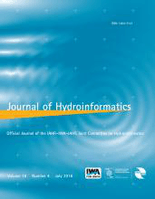
JOURNAL OF HYDROINFORMATICS
Scope & Guideline
Empowering Research in Water Engineering and Sciences.
Introduction
Aims and Scopes
- Hydrological Modeling and Simulation:
The journal emphasizes innovative modeling techniques to simulate hydrological processes, including rainfall-runoff modeling, groundwater flow, and flood forecasting. - Data-Driven Approaches:
A significant focus is placed on the use of machine learning, artificial intelligence, and data assimilation techniques for enhancing predictive capabilities and decision-making in water resource management. - Water Quality Assessment and Management:
Research articles often address the dynamics of water quality in various environments, utilizing advanced monitoring technologies and modeling frameworks. - Hydraulic Engineering and Infrastructure:
The journal covers studies related to the design, optimization, and management of hydraulic systems, including urban drainage, wastewater treatment, and flood control measures. - Remote Sensing and GIS Applications:
Utilization of remote sensing and geographic information systems (GIS) for spatial analysis and monitoring of hydrological phenomena is a prominent area of research. - Climate Change Impacts on Water Resources:
The journal also explores the implications of climate change on hydrological cycles, water supply, and flood risk management, emphasizing adaptive strategies.
Trending and Emerging
- Machine Learning and AI Applications:
There is a significant increase in the application of machine learning and AI techniques for predictive modeling, data analysis, and optimization in water resource management. - Smart Water Management Systems:
Emerging research focuses on smart technologies, including IoT-based monitoring and control systems, to enhance the efficiency and effectiveness of water distribution and management. - Integrated Water Resource Management (IWRM):
The trend towards integrated assessments that consider the interactions between surface water and groundwater systems is becoming more prominent, reflecting a holistic approach to water resources. - Climate Resilience and Adaptation Strategies:
A growing body of work is dedicated to developing strategies for enhancing the resilience of water systems against climate change impacts, including drought and flooding. - Real-Time Monitoring and Decision Support Systems:
Research is increasingly focused on real-time data acquisition and processing frameworks that support timely decision-making in water management contexts.
Declining or Waning
- Traditional Hydrological Models:
There is a noticeable decline in studies focusing solely on conventional hydrological models without the integration of advanced computational techniques, as researchers increasingly favor data-driven and hybrid methodologies. - Fixed Infrastructure Solutions:
Research emphasizing traditional fixed infrastructure solutions for flood management is waning as there is a shift towards adaptive, nature-based solutions and smart technologies. - Single-Domain Studies:
The focus on isolated studies within single domains, such as purely hydraulic or hydrological systems without interdisciplinary integration, seems to be decreasing in favor of more holistic approaches.
Similar Journals

Hydrology Research
Pioneering solutions for global water challenges.Hydrology Research, a leading academic journal published by IWA Publishing, is dedicated to advancing the field of water science and technology. With an impressive impact factor and a Q2 ranking in its category, the journal plays a pivotal role in disseminating innovative research and practices in hydrology. Established in 1973 and transitioning to an Open Access model in 2020, it provides unrestricted access to high-quality articles that cover a broad spectrum of topics, including hydrological processes, water management, and environmental impact assessments. Situated in Denmark, Hydrology Research continues to thrive as an essential platform for researchers, professionals, and students alike, encouraging the exchange of ideas that contribute to sustainable water solutions worldwide. With a comprehensive coverage of research converging from 1973 to 2024, it stands as a testament to ongoing progress in the water science community.
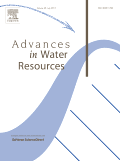
ADVANCES IN WATER RESOURCES
Exploring innovative solutions in water resource management.ADVANCES IN WATER RESOURCES is a premier peer-reviewed journal published by Elsevier Science Ltd, dedicated to advancing the field of water science and technology since its inception in 1977. With an impressive Q1 ranking in the field, this journal provides a vital platform for researchers, professionals, and students to disseminate cutting-edge research that addresses critical issues related to water resources management, hydrology, and environmental sustainability. The journal offers a comprehensive collection of articles that explore innovative methodologies, policy implications, and case studies that shape the future of water resource management. Although it does not provide open access, its impactful contributions are recognized globally, making it an essential resource for anyone engaged in water science. The journal continues to publish relevant research while looking forward to bridging the gap between theoretical insights and practical applications up until 2024.

Hydrology
Fostering dialogue on water resource management.Hydrology, published by MDPI, is a prominent open-access journal dedicated to advancing the field of hydrological science. Since its establishment in 2014, the journal has garnered a reputation for excellence, reflected in its classification within the Q2 quartile for 2023 across multiple categories including Earth-Surface Processes, Oceanography, Water Science and Technology, and Waste Management and Disposal. Based in Switzerland, Hydrology provides a vital platform for scholars and practitioners to disseminate research findings, promote innovative methodologies, and foster discussions on current trends affecting water resources and management globally. The journal is easily accessible online and aims to significantly contribute to the understanding of hydrological processes, offering insights that are pivotal for addressing contemporary environmental challenges. With Scopus rankings showcasing its growing influence, Hydrology is a crucial resource for researchers, students, and professionals committed to water science and sustainable practices.

JOURNAL OF THE AMERICAN WATER RESOURCES ASSOCIATION
Connecting researchers and practitioners in the vital realm of water resources.The JOURNAL OF THE AMERICAN WATER RESOURCES ASSOCIATION, published by Wiley, is a premier platform dedicated to advancing the field of water resource management and research. With an ISSN of 1093-474X and an impressive Q1 ranking in multiple categories, including Earth-Surface Processes, Ecology, and Water Science and Technology, this journal serves as a vital resource for professionals, researchers, and students alike. Established in 1967 and set to converge through 2024, it has consistently published cutting-edge research that influences policy and practice in water resource management. The journal's open access option enhances its reach, ensuring that critical findings are accessible to a wider audience. The Scopus rankings further underscore its impact, placing it in the top quartile within its fields, highlighting its importance in shaping scholarly discourse. As a significant contributor to the understanding and management of freshwater systems, the journal offers a crucial means for sharing insights and fostering collaboration in the vital realm of water resources.

Russian Meteorology and Hydrology
Exploring the depths of meteorology and hydrology.Russian Meteorology and Hydrology is a distinguished journal published by PLEIADES PUBLISHING INC, specializing in the fields of meteorology and hydrology. With an ISSN of 1068-3739 and an E-ISSN of 1934-8096, this journal has been an authoritative source of research and insights since its inception in 1993. Aiming to disseminate cutting-edge research and foster discussions across related disciplines, it ranks in the Q4 category for Atmospheric Science and Q3 for both Fluid Flow and Transfer Processes as well as Water Science and Technology as of 2023. While currently not an open-access publication, it provides crucial insights essential for researchers, professionals, and students dedicated to understanding the complexities of climate systems and water resources. With its focus on innovative methodologies and comprehensive studies, Russian Meteorology and Hydrology remains a vital platform for advancing knowledge and practice in these critical domains.
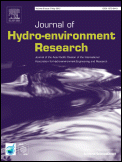
Journal of Hydro-environment Research
Innovating research for a resilient hydro-environment.The Journal of Hydro-environment Research, published by Elsevier, serves as a leading platform for advancing knowledge in the fields of civil and structural engineering, environmental chemistry, and water science. With a robust impact factor reflecting its Q2 category ranking across various disciplines—including Environmental Engineering and Management, Monitoring, Policy and Law—it emphasizes high-quality research that addresses pressing environmental challenges. Embracing a global perspective, the journal explores interdisciplinary approaches to water and environmental management, thus empowering researchers and professionals to innovate and implement effective solutions. Since its inception in 2007, the journal has continually evolved, with its scope expanding into emerging areas pertinent to water science and technology. The journal is indexed in esteemed databases, ensuring wide dissemination and accessibility of published works, although it does not currently operate on an open access model. Addressing the intricate interplay between human activities and water resources, the Journal of Hydro-environment Research is quintessential for those dedicated to fostering sustainable practices and enhancing our understanding of hydro-environmental systems.
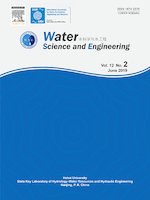
Water Science and Engineering
Advancing Knowledge in Water Science and EngineeringWater Science and Engineering, published by ELSEVIER, is a premier open access journal that has been disseminating vital research in the realms of civil and structural engineering as well as ocean engineering since 2008. With its ISSN 1674-2370 and E-ISSN 2405-8106, this journal plays a crucial role in advancing knowledge and innovation within the sector, evidenced by its impressive rankings in Scopus—holding the 15th position out of 105 in Ocean Engineering and 76th out of 379 in Civil and Structural Engineering, placing it in the 86th and 80th percentiles, respectively. Attaining a Q1 classification in both categories for 2023 highlights its importance and influence in the academic and professional communities. The journal addresses a broad spectrum of topics integral to water sciences, offering significant insights for researchers, professionals, and students alike. With a convergence period spanning from 2010 to 2024, it continues to explore contemporary issues and advancements, providing a pivotal platform for the dissemination of research. The journal is accessible to a global audience, reaffirming its commitment to fostering open access and enhancing accessibility to vital scientific literature.

Journal of Hydrology-Regional Studies
Unveiling critical knowledge for water sustainability.Journal of Hydrology-Regional Studies, published by ELSEVIER in the Netherlands, stands as a leading open-access platform since 2014 for disseminating high-quality research in the fields of hydrology and water management. With an impressive impact factor and recognition as a Q1 journal in both Earth and Planetary Sciences and Water Science and Technology categories, it emphasizes regional studies that advance understanding of hydrological processes and their implications for sustainable management practices. The journal has established a significant global reach, evident from its Scopus rankings, which place it in the top percentiles within its disciplines, fostering a dynamic exchange of ideas among researchers, professionals, and students alike. By mobilizing critical insights and innovative solutions in hydrology, this journal aims to contribute to solving the pressing water-related challenges faced by our society.

Journal of Applied Water Engineering and Research
Integrating Technology for Effective Water ManagementJournal of Applied Water Engineering and Research is a dynamic platform dedicated to the advancement of knowledge in the field of water science and technology. Published by Taylor & Francis Ltd, this journal aims to bridge the gap between theoretical research and practical applications in water engineering, providing a crucial resource for researchers, practitioners, and policymakers. With an ISSN of 2324-9676 and an impressive ranking in the Q3 category for Water Science and Technology, it occupies a distinctive position within the scholarly community. The journal covers a wide spectrum of topics, including innovative water management strategies, sustainable practices, and the integration of technology in water resource management, thus contributing significantly to the discourse surrounding environmental sustainability. With publication years converging from 2013 to 2024, the Journal of Applied Water Engineering and Research continues to foster impactful research, enhancing our understanding and management of vital water resources.
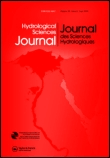
Hydrological Sciences Journal
Advancing water science for a sustainable future.Hydrological Sciences Journal, published by Taylor & Francis Ltd, is a leading peer-reviewed publication dedicated to advancing the field of hydrology, spanning topics from water management to climate impacts on hydrological systems. With an impressive impact factor and a noted Q1 category ranking in Water Science and Technology, the journal occupies a pivotal role in the academic landscape, facilitating high-quality research dissemination since its inception in 1982. The journal is indexed in Scopus, holding a commendable rank of #48 out of 261 in the Environmental Science category, placing it in the 81st percentile among its peers. Although it does not offer Open Access options, the journal ensures extensive reach and readership through institutional subscriptions. As it converges toward its milestone of 2024, the Hydrological Sciences Journal remains an indispensable resource for researchers, professionals, and students eager to explore the latest advancements and methodologies in hydrological research.